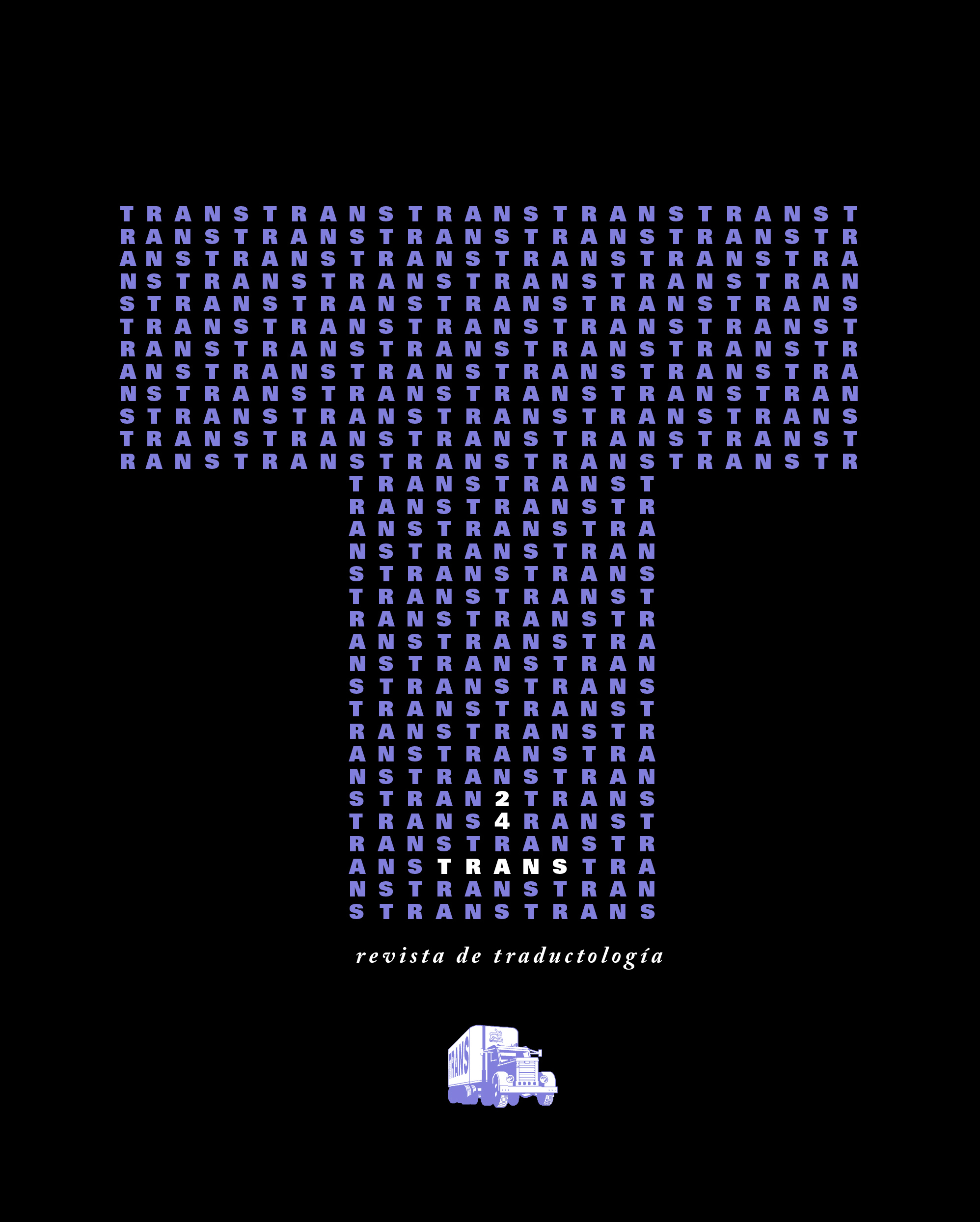Juzgar un libro por su cubierta: un enfoque paratraductológico de la traducción del Manifiesto Comunista a las lenguas minoritarias del Estado Español
DOI:
https://doi.org/10.24310/TRANS.2020.v0i24.7559Keywords:
paratranslation, function, minority languages, Basque, Catalan, Galician, Communist ManifestoAbstract
This paper traces the history of the Asturian, Basque, Catalan and Galician translations of the Communist Manifesto, emphasising the role played by translation in its spread. The paper applies the concept of paratranslation to the wide array of translations in these languages to determine their underlying function. The results distinguish between several functions, ranging from political, commemorative and historical to academic and didactic editions. The paper concludes that, while all of the translations derive from the same original source text, they do not all perform the same function, rendering them not only autonomous of each other but also of the source text itself.
Downloads
Metrics
Publication Facts
Reviewer profiles N/A
Author statements
Indexed in
-
—
- Academic society
- N/A
- Publisher
- Universidad de Málaga
References
Ahmad, Aijaz (1999): “The Communist Manifesto In Its Own Time, and In Ours”, in Karat Prakash (ed.), A World to Win: Essays on the Communist Manifesto, New Delhi: LeftWord, 14-47.
Argemí, Lluís (1999): “El Manifest comunista en la història del pensament”, Papers. Revista de Sociologia, 57, 11-20.
Azurmendi, Joxe. K. (1998): “K. Marxen eboluzioa Manifestu-ra arte. Hegelen idealismotik materialismo historikora [‘K. Marx’s evolution up to the Manifesto. From Hegelian idealism to historical materialism’]”, in Karl Marx and Friedrich Engels, Alderdi Komunistaren Manifestua [‘Manifesto of the Communist Party’], Donostia/San Sebastián: Jakin, 7-48.
Bastardes, Enric (1989): “Jesús María Rodés. De la cárcel por comunista a la enseñanza policial”, El País, 4 January, <https://elpais.com/diario/1989/01/04/ultima/599871603_850215.html> [Accessed: 06-VII-2020].
Baxter, Robert Neal (2018): “Análise paratradutiva das diferentes edicións do Manifesto do Partido Comunista ao galego: a ideoloxía das marxes”, Revista Galega de Filoloxía, 19, 31-60.
Baxter, Robert Neal (2021. In press.): “Història i anàlisi paratextual de les traduccions del Manifest del Partit Comunista al català”, Quaderns: Revista de traducció, 28, s.p.
Blum-Kulka, Shoshana (2004 [1986]): “Shifts of Cohesion and Coherence in Translation”, in Lawrence Venuti (ed.), The Translation Studies Reader, London and New York: Routledge, 298-313.
Boyer, George R. (1998): “The historical background of the Communist Manifesto”, Journal of Economic Perspectives, 12/4, 151-174.
Cruces Colado, Susana (1993): “A posición da literatura traducida no sistema literario galego”, Boletín Galego de literatura, 10, 59-65.
Even-Zohar, Itamar (1990): Polysystem Studies, Durham (NC): Duke University Press.
García González, Marta (2005): “Translation of minority languages in bilingual and multilingual communities”, in Albert Branchadell and Lovell Margaret West (eds.), Less Translated Languages, Amsterdam: John Benjamins, 105-123.
Garrido Vilariño, Xoán Manuel (2005): “Texto e Paratexto. Tradución e Paratradución”, Viceversa. Revista galega de tradución, 9-10, 31-39.
Gasch Grau, Emili (1975): “Difusió del Manifest comunista a Catalunya i Espanya (1872-1939)”, Recerques: Història, economia i cultura, 5, 21-30.
Genette, Gérard (1982): Palimpsestes. La Littérature au second degré, Paris: Éditions du Seuil.
Genette, Gérard (1987): Seuils, Paris: Éditions du Seuil.
Luna Alonso, Ana (2006): “A Biblioteca Galega dos Clásicos universais”, Viceversa. Revista galega de tradución, 12, 187-201.
Máiz Suárez, Ramón (1998): “Marx, Engels e a revolución de 1848”, in Karl Marx and Friedrich Engels, O Manifesto Comunista, Vigo: Xerais, 5-29.
Martínez de Sas, María Teresa and Pelai Pagès i Blanch (2000): Diccionari biogràfic del moviment obrer als països catalans, Barcelona: Universitat Barcelona y Abadia de Montserrat.
Mientras Tanto (2008): “Maria Rosa Borràs: in memoriam”, Mientras Tanto, 107, 5-9.
Mota Muñoz, José Fernando (2010): “‘Un espectre atemoreix Europa: l’espectre del comunisme’. Vuitanta anys de la primera traducció al català del Manifest comunista”, Associació Catalana d’Investigacions Marxistes (ACIM), <http://www.fcim.cat/bloc/2010/10/05/un-espectre-
atemoreix-europa-lespectre-del-comunisme-vuitanta-anys-de-la-primera-traduccio-catalana-del-manifest-comunista/> [Accessed: 06-VII-2020].
Nord, Christiane (2012): “Paratranslation – a new paradigm or a re-invented wheel?”, Perspectives. Studies in Translation Theory and Practice, 20/4, 399-409.
Paradela López, David (2011): “‘Un mundo que ganar’: la traducción del Manifiesto Comunista”, El Trujamán. Revista diaria de traducción, 19 August, <https://cvc.cervantes.es/trujaman/anteriores/agosto_11/19082011.htm> [Accessed: 06-VII-2020].
Rich, Adrienne (2015): “Preface: Karl Marx, Rosa Luxemburg and Che Guevara”, in Deborah Shnookal (ed.), Manifesto: Three Classic Essays on How to Change the World (Ernesto Che Guevara, Friedrich Engels, Karl Marx, Rosa Luxemburg), Washington: Ocean Press, 1-10.
Riera Llorca, Vicenç (1974): “Passada la ratlla: Sobre les versions catalanes d’un text cèlebre”, Serra d’Or, XVI/172, 97.
Robles, Antonio (2014): Historia de la Resistencia al Nacionalismo Catalán, Pennsauken: BookBaby.
Rodés, Jesús María (1976): “Presentació”, in Karl Marx and Friedrich Engels, Manifest del Partit Comunista, Barcelona: Undarius, 5-17.
Downloads
Published
How to Cite
Issue
Section
License
All contents published in TRANS. Revista de Traductología are protected under the Creative Commons Attribution-NonCommercial-ShareAlike 4.0 International (CC BY-NC-SA 4.0) license. All about this license is available in the following link: <http://creativecommons.org/licenses/by-nc-sa/4.0>
Users can copy, use, redistribute, share and exhibit publicly as long as:
- The original source and authorship of the material are cited (Journal, Publisher and URL of the work).
- It is not used for comercial purposes.
- The existence of the license and its especifications are mentioned.
- ShareAlike — If you remix, transform, or build upon the material, you must distribute your contributions under the same license as the original.
There are two sets of authors’ rights: moral and property rights. Moral rights are perpetual prerogatives, unrenounceable, not-transferable, unalienable, imprescriptible and inembargable. According to authors’ rights legislation, TRANS. Revista de Traductología recognizes and respects authors moral rights, as well as the ownership of property rights, which will be transferred to University of Malaga in open access.
The property rights are referred to the benefits that are gained by the use or the dissemination of works. TRANS. Revista de Traductología is published in an open access form and it is exclusively licenced by any means for doing or authorising distribution, dissemination, reproduction, , adaptation, translation or arrangement of works.
Authors are responsable for obtaining the necessary permission to use copyrighted images.













21.png)
